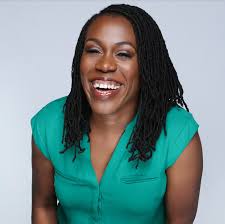Our editors independently select these products. Making a purchase through our links may earn Well+Good a commission
What You Need To Know In Order To Start Investing in the Stock Market and Building Wealth
In this edition of "Change Matters," Tiffany Aliche breaks down how to start investing in the stock market to start building wealth.

Regardless of what your relationship with money has been like in the past, there’s really no time like the present to start shifting your money mindset and taking a more balanced approach to paying off any debt, saving, and investing. Since you cannot save and budget yourself into wealth, doing all three of those things simultaneously is important in order to properly prepare for your financial future. That’s why it’s important to learn how to start investing in the stock market.
Let’s break down the importance of learning how to invest using a hypothetical situation to make the topic less overwhelming: Let’s say you just won $100,000 in the lottery. What would you do with the cash? If you have $98,000 in relatively low-interest student loan debt, maybe your instinct is to pay that off in full. But, if you go this route, consider what your finances will look like in one week. Hint: You’re still broke.
In a situation like this, a better financial strategy—specifically if your debts are of the low-interest variety—might have been to prioritize building wealth instead of aggressively paying down those loans. This might look like sticking to a low-interest-debt payoff plan, wherein you contribute moderate (or minimum) amounts monthly, and use the excess to learn, earn, and grow through investments. I’m not suggesting that you should forget about your debt; however, I am urging you to be more strategic about repaying it. After all, debt freedom is a byproduct of wealth, not the other way around.
The goal is to allow your investments to actively build you wealth and to eventually pay off your debts more aggressively once said wealth begins to manifest.
The goal is to allow your investments to actively build you wealth and to eventually pay off your debts more aggressively once said wealth begins to manifest. And now that you understand the overarching intention behind investing and how doing so can help you improve upon your financial wellness, which is central to your general wellness, let’s get acquainted with 101-level terms to understand before you learn more about how to start investing in the stock market.
Terms to know for stock-market literacy
Stocks
Stocks represent fractional ownership of a company. Stocks have the potential to both grow exponentially or to fall completely flat, and there’s no guarantee on the amount you’ll earn (or lose). They’re driven by unpredictable market factors and are higher risk.
Bonds
Bonds, on the other hand, are equivalent to a loan to a company or state. Think of bonds as IOUs for a company to pay you back with interest. Bonds are much more stable than stocks, but they tend to offer less growth opportunity.
Mutual funds
Mutual funds are a group of stocks, bonds, and other securities that you buy alongside a group of people. (Note: these funds are managed by professionals and can only be purchased once daily after the stock market closes).
ETFs
Exchange-traded funds (ETFs) are a curated collection of different types of investments and are sort of like a cross between stocks are mutual funds. They can be bought, sold, and traded on the stock market during trading hours, similar to actual stocks.
Index funds
Index funds are made up of a portfolio of investments that are designed to imitate the behavior of the market at large. Some of the most popular ones are the S&P 500 (measures the stock performance of 500 large companies of various sectors on the US stock exchange), the Dow (made up of 30 well known top companies), and the Nasdaq (mostly technology companies and smaller start-ups).
How to actually start investing in the stock market and building wealth
Before investing for wealth, make sure you’re actually in a stable position to do so. If you’re not able to pay your current bills and aren’t making retirement contributions, it’s probably a good idea to hold off. Also, do your best to pay off any high-interest debt and also secure a rainy-day emergency fund for yourself (which I recommend amounts to three-to-six month’s worth of take-home pay).
Next, decide how much you can realistically set aside for investing each month. This step may open up your eyes to a reality that perhaps it’s time to cut back on certain expenses and set clear goals for how you want the additional wealth generated to work for you.
As another best practice, you should only invest money that you won’t need over the next five years, since you likely won’t always see profits right away. (Again, the market is unpredictable, so this won’t always be the case, but it is still a wise guideline under which to invest.) If you’re looking to invest more aggressively and have a high risk tolerance, you can look into signing up with an online stock broker like TD Ameritrade, E*TRADE, or Fidelity. You can also hire a personal finance advisor to walk you through the process, or for a less hands-on, personalized assist, you might try using virtual “robo” advisors like Betterment, Vanguard, or Acorns.
When it comes time to decide the investment vehicles you want to use, be sure to keep your investing “personality” in mind. If you prefer to stay on the safe side, start with mutual funds since they have moderate risk. Feeling brave? Try your hand at buying individual stocks. If you’re in the middle of the spectrum in that you’re curious about stocks but still wary of the risks, ETFs are a great compromis .
Now, start investing! Create scheduled payments to your investment vehicle of choice and ignore the noise. Don’t get scared or discouraged by the news cycles, because the market will always have its good and bad days. Stay the course; invest in your financial wellness and in yourself.

Tiffany “The Budgetnista” Aliche is a financial educator, author of Get Good With Money, and founder of The Budgetnista.
Oh hi! You look like someone who loves free workouts, discounts for cult-fave wellness brands, and exclusive Well+Good content. Sign up for Well+, our online community of wellness insiders, and unlock your rewards instantly.









